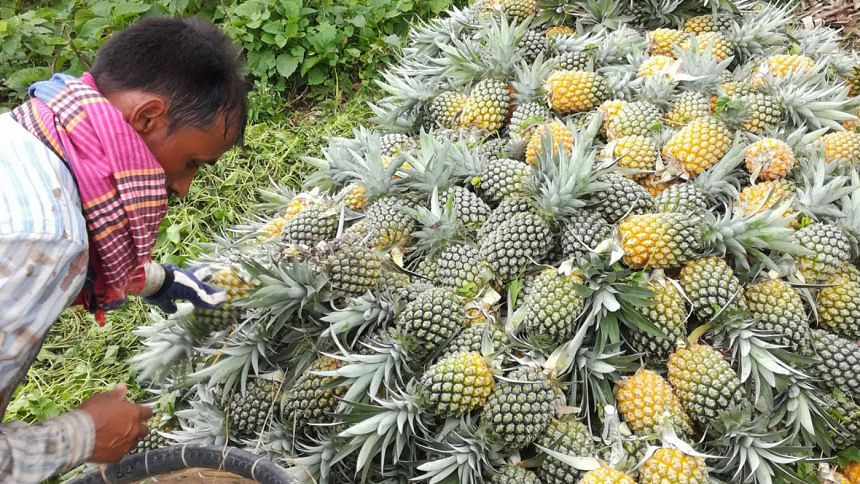Pineapples of Madhupur: Tainted with excessive chemicals

Pineapples grown in Tangail's Madhupur are known to be delicious, but most farmers this time are using excessive hormone to grow bigger fruits and ripe them ahead of time.
Lacking proper knowledge, they do this to make an extra profit, say environmentalists.
As a result, the fruit is losing its sweet taste and aromatic flavour, and consumers are at risk of different health problems.
Moreover, farmers are using too much chemical fertilisers and pesticides in pineapple fields, reducing fertility of the soil and also destroying ecological balance and diversity.
Environmentalists also blamed a lack of proper monitoring, training and motivation by the authorities concerned for the wrong practice of the growers.
Madhupur Garh region is known for producing copious amounts of pineapples, including Giant Q, Honey Queen and Joldungli varieties.
The harvest time of this region's pineapple is between June and August.
Mahmudul Hasan, Madhupur upazila agriculture officer, said pineapple is cultivated on around 6,500 hectares of land in the upazila. Over 3,000 hectares in nearby Ghatail upazila of the district is also used for growing the fruit. It is grown in Phulbaria upazila of Mymensingh as well. Around two lakh tonnes of pineapple are produced in the region every year.
Pineapples grown in the region are juicy and tasty. The demand for the fruit is also higher this year than the previous years, he said.
Many believe consuming pineapple can help them prevent contracting Covid-19 as the fruit is a good source of vitamin C.
Shahid Mahmud, executive director of Sabuj Prithibi, a Tangail-based green organisation working for ensuring safe food, however, said the region's pineapple is losing its good reputation due to the alleged use of excessive hormone.
The growers have to depend on chemical traders' suggestions as local agriculture officials do not come up with their advices, he said.
If chemicals are applied, the fruit will ripen overnight and the beneficial nutrients will be lost, he added.
"Actually, we have no knowledge about hormones. We use it as per suggestions of local chemical traders," said Shamsul Haque, a farmer from Aushnara area in Madhupur.
Sale of growth hormones like Cropscare, Superfix, Planofix, Anafix, Plantfix, Cyanofix, and Sarafix picks from May to June.
The major quantity of pineapple ripening hormones such as Prolong, Ripen, Promote, Bright, Ethephon, and Tomtom is sold from July to August.
Though it is written on the chemical packets that these are not harmful for human health and environment, physicians say consuming chemically treated fruits can cause diseases.
Medicine specialist Dr Ashraf Ali said, "I don't know much about growth hormones, but the chemicals used for ripening fruits are harmful for human health."
Sources said farmers have been doing this in recent years after being motivated by representatives of different chemical companies.
Farmers also use too much chemical fertilisers in their fields hoping to get better yields.
Experts, however, say one third of the fertilisers being used is enough if those can be used properly.
Using excessive growth hormones makes pineapple bigger, but the fruit becomes sour and tasteless, say locals.
Farmer Fazlul Haque of Kuragachha in Madhupur has been cultivating pineapple since 1988. This year, he has grown the fruit on 12 bighas of land. He uses hormones in his fields.
Asked why he uses hormones, Fazlul said pineapples grown without hormones become small and look black. The buyers, however, like large yellow fruits.
"Wholesalers also prefer the fruits ripened by hormones as those remain fresh for a longer period than the fruits which ripe naturally," he said.
Farmers said bees and flies do not sit on chemically-treated pineapples and cannot damage those. Moreover, foxes do not eat or touch those.
A farmer said pineapples in the region become ripe at a time and they have to incur losses if they are not able to sell their produce at a fair price. "So, we need to take the fruit to markets in phases after ripening those with hormones."
Nazrul Islam, a grower at Moterbazar of Ghatail upazila, does not use hormones for ripening pineapple. He said the fruit has an aromatic flavour when it is matured and starts ripening naturally.
Contacted, agriculturist Ahsanul Bashar, deputy director of Department of Agricultural Extension in Tangail, claimed that the hormones the growers use are not so harmful.
"Hormones are widely used all over the world for growing pineapple. However, these should not be used excessively. We convey this message to the fruit and vegetable growers at training programmes," he said.
Ahsanul, however, admitted that they have no separate training programmes for the pineapple growers.
Farmers said they are not getting fair prices of their produce due to a lack of proper marketing system and preservation facilities.
They said they would get fair prices if different fruit processing factories, which produce jam, jelly and juice, are set up based on pineapples from Madhupur.

 For all latest news, follow The Daily Star's Google News channel.
For all latest news, follow The Daily Star's Google News channel. 



Comments